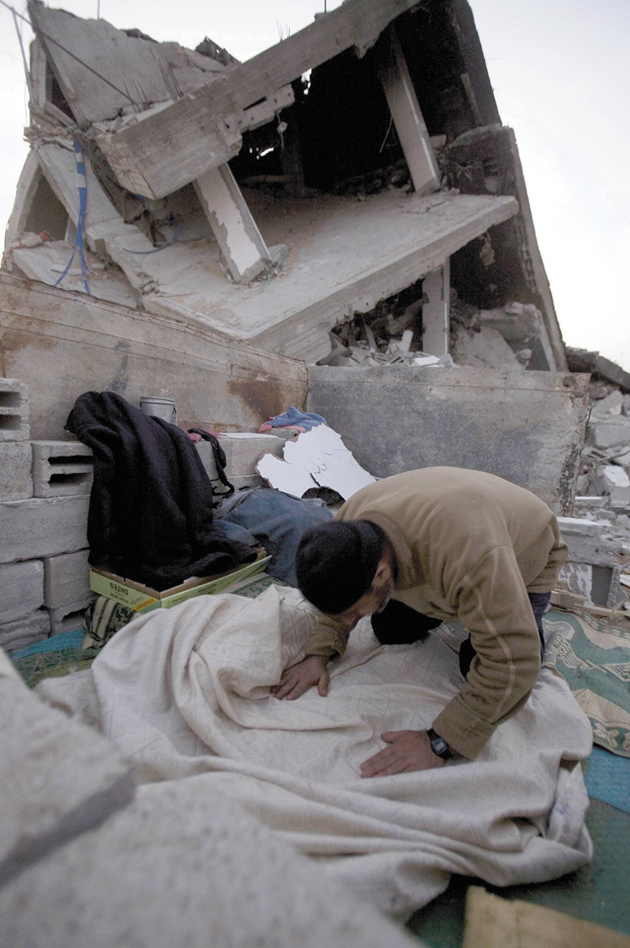On the eve of the war in Gaza, Robert Malley and Hussein Agha wrote “How Not to Make Peace in the Middle East” [NYR, January 15], a critical review of US policies in the region during the Clinton and Bush years, and a call for a new approach. On January 24, a few days after the end of the conflict, Malley spoke to Hugh Eakin about its consequences. Following are excerpts of the interview, which is available in full at nybooks.com/podcasts.
Hugh Eakin: In Gaza, does Hamas retain the ability to govern?
Robert Malley: All the reporting we’ve been getting, both during and after the war, is that, for all the massive destruction and the large number of victims, Hamas’s authority has not been eroded. They have reasserted it, sometimes ruthlessly, since the end of the war. They are back, policing the streets. Of course, they don’t have the same means they had in terms of police stations, and basic infrastructure of government. But in terms of asserting authority, there is really no political alternative today in Gaza that could challenge Hamas. And so if the objective of the war was to weaken Hamas’s grip on Gaza, that failed.
H.E.: Should the US have contact with Hamas?
R.M.: I’ve never advocated direct engagement with Hamas, because we know the political realities here. My argument is different. What I say is that we have to start from a factual realization that the policies of the last two years have not only failed to achieve their objectives. They often produced the precise opposite of what we sought to promote.
If we start from that, then we have to think about how we should deal with Hamas and Gaza differently. And that doesn’t necessarily mean for the US to start treating Hamas the way it treats Fatah. But it does mean that it’s going to be very hard to have a political agreement between Israelis and Palestinians, or genuine stability, if they are not somehow part of that political equation.
Now maybe it means for the US to take a less interventionist approach toward domestic Palestinian politics; maybe it means for the US to take a less obstructionist approach, when other third parties—whether it’s the Europeans or the Arabs—seek to reconcile the Palestinians, and in doing so, engage with Hamas. Maybe it means for the US to take a less hostile view toward the emergence of a potential, putative new unity government among Palestinians, and say, as the Europeans now are hinting, that they would judge it by what it does, rather than by the ideological position of its membership. I think those are steps that the Obama administration should consider.
H.E.: How do you see the appointment of George Mitchell as special envoy to the Middle East affecting all of this?
R.M.: Mitchell is new, but he is not a newcomer. He’s dealt with this before, in the Mitchell Report [on Israeli–Palestinian violence, of April 2001]; but he doesn’t come to it with the baggage that others might have. So you have the combination of somebody who is certainly seasoned and experienced, but in some way could also come with a fresh look. And so perhaps he could embrace a vision, as we called for in the article, that is not encumbered, by either the mistakes of the last eight years [of the Bush administration] or the mistakes of the preceding eight years [of the Clinton administration]; and that is prepared to take a deep breath, take stock of where the region is, and where the Israelis and Palestinians are, and then devise a policy.
George Mitchell strikes me at least as somebody who, as he writes in his books and articles about Northern Ireland, likes to listen, and always thinks that’s the best first step one can take, before plunging in.
H.E.: Assuming that this approach could be found, is there any hope, at this point, that there is enough popular support for some kind of solution?
R.M.: It’s always hard to measure. We have opinion polls, which I often question, that show both sides still support a solution. I think we have to start with the recognition that there are some things that both sides will always want: whether it’s dignity, security, safety, a normal life, that Israelis and Palestinians, regardless of what happens, are going to want to achieve. And those are the things that any solution will need to address. I don’t think people get tired of addressing these concerns. They may get tired of the way it’s being done. They may get tired of the fact that it never gets done. But ultimately, whether you are an Israeli or a Palestinian, you are not about to be exhausted, or grow weary, of the core concerns that always animate you.
Advertisement
If one could find the right approach and it addresses the grievances and concerns that both sides have, then it will always be current.
This Issue
February 26, 2009




